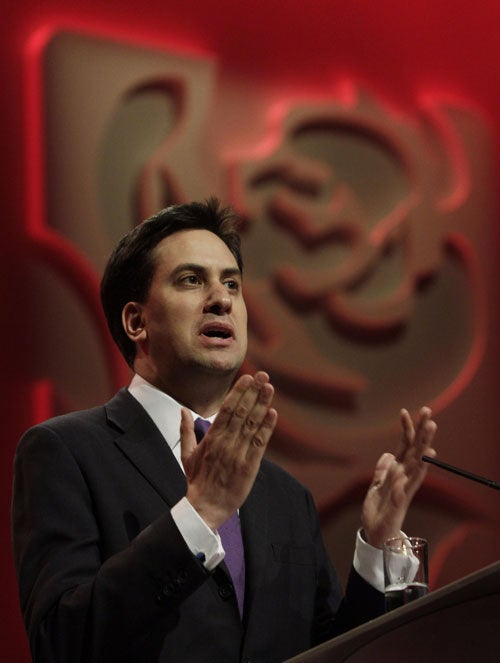Alan Johnson: A letter to the new Labour leader
The Shadow Home Secretary gets in early with six pieces of advice for the younger Miliband who came out on top yesterday

Dear Ed
Congratulations! It's been quite a contest, mostly good-natured if a little too long. All the candidates acquitted themselves well and emerged with heads held high. But to the victor the spoils. Now the hard work begins.
If history were to be our guide, you would have won the leadership at a time when Labour is defeated, demoralised and set for a long period out of government. If truth were told, many MPs and activists in the party were relieved to return to the ideological purity of opposition.
Of course, if you choose to lead us back to our comfort zone, history might repeat itself; but having secured three successive terms in government we are a very different party, ready and willing to take a short cut to renewed electoral success. We are down but certainly not out. We can rebuild quickly and present a powerful alternative to the slowly fracturing coalition (fractured coalition? Call Cable Guy).
You will receive lots of advice on how to do this. I wanted to get in early with half a dozen points that you may want to consider.
One: Use the parliamentary party wisely. It has a fresh and vigorous look about it. The election in 2010 (and indeed 2005) brought in a keen, bright and enthusiastic bunch unburdened by some of the tensions of our recent history. Fresh talent is a prerequisite for renewal, so it's important that you rapidly promote the best from among them, while not forgetting those who were brilliant ministers of state and deserve to be in the Shadow Cabinet, but were unsuccessful in the ballot. God knows why we are electing the shadow Chief Whip separately. You need to watch it doesn't become an alternative powerbase.
Two: The public are certainly not sold on the notion of radical cuts to public services. There is no point in getting into a cheese-paring contest with the coalition over this. We put a deficit reduction programme to the public which was rejected. It has to be our starting point for some fresh thinking. But remember, by the time of the next election the debate will have moved on. Indeed, it is a traditional feature of British politics that Conservative governments do great harm to public services and it becomes Labour's task to restore them. It looks like that particular bit of political history might repeat itself.
Three: Maximise the benefits from a growing Labour Party. We may struggle to get to the membership levels of the mid-Nineties, but people are still joining in significant numbers. We need to harness that renewed interest with an agenda that promotes localism, community growth and the rebuilding of our powerbase in local government (another prerequisite for national electoral success).
Four: Do not adopt a "core vote strategy" for winning the election. We do need to restore trust with our traditional supporters, but we also need to win back the middle-class voters who switched to the Lib Dems. More importantly, outside London we have been practically wiped out in the South-east, attracting only 16 per cent of the vote. Most of those seats are Tory and we need to win some of them to get a majority. That means appealing to people who voted Conservative in 2010 and 2005.
Five: So don't move the party to the left. We know elections are won on the centre ground of politics. We learned that the hard way in the Eighties, as did the Tories from 1997 onwards. Our success in government was to shift the centre ground to the left. David Cameron has done much to detoxify the Conservative brand in order to try to follow us. He now holds together an unholy alliance of left-leaning Lib Dems and (still) Europe-obsessed right-wing Tories. This allows him to pitch up in the middle. Recognise also that the Tories, not the Lib Dems, are the target. This is a Tory government with the Lib Dems strapped on as ballast.
Six: Think "out of the box" (as I believe they say in management-speak). The very existence of the coalition has demonstrated that the public is willing to accept new and innovative thinking about how we manage government in the UK. During your campaign, all candidates spoke regularly of not returning to the old ways. Now show you mean it. Breathe new life into our education policy; define localism and community activism in a way that is not a metaphor for filling gaps in public services; understand that the public does not want to see a reverse in the progress we made in tackling crime. Oh, and for goodness' sake, don't pursue a graduate tax. We should be proud of our brave and correct decision to introduce tuition fees. Students don't pay them, graduates do, when they're earning more than £15,000 a year, at very low rates, stopped from their pay just like a graduate tax, but with the money going where it belongs: to universities rather than the Treasury.
Of course, there is much more than this for you to do. Restoring trust with the public will take time, but the 2010 election showed it has not been entirely broken. So you will need to set your course and communicate your vision in an exciting way until the public is clear what Labour stands for and how it has changed in response to electoral defeat.
Do pass on my regards to David and tell him I'd have sent exactly the same letter to him had he won.
Best wishes, Alan
Join our commenting forum
Join thought-provoking conversations, follow other Independent readers and see their replies
Comments
Bookmark popover
Removed from bookmarks